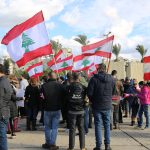Lebanese Central bank governor charged with corruption and money laundering


The similar claim was leveled against Anna Kosakova, a Ukrainian national who owns a firm with Raja Salameh. According to the judicial source, Aoun is examining if a number of residential units in Paris belong to Riad Salameh. According to the source, his brother previously claimed the flats belonged to the central bank. For alleged financial malfeasance, Aoun imposed a travel ban on the central bank chief earlier this year and ordered security agents to bring him in for interrogation.
The judge is in charge of multiple legal proceedings involving the governor of the central bank, who has routinely failed to appear at sessions. Salameh has been adamant in his denial of any wrongdoing. He has accused Aoun of “personal animosity,” claiming that the prosecution is politically motivated and part of a “organized attempt to smear” his image.
Related Posts
Last Thursday, Raja Salameh was detained on charges of “money laundering, embezzlement, unlawful enrichment, and smuggling significant sums of money” out of the country. After the Swiss top prosecutor’s office requested assistance in an investigation into more than $300 million that he allegedly embezzled from the central bank with the cooperation of his brother, Lebanon launched a domestic inquiry into Riad Salameh’s fortune last year.
Salameh is also facing legal action in France and the United Kingdom, among other European nations. Lebanon’s three-decade-long top banker is being accused for actions that contributed to the country’s financial collapse, an accusation he has consistently rejected. On Monday, Lebanese banks began a two-day strike to protest legal actions taken by the judiciary against major bankers, including property seizures, branch closures, and the issuing of travel bans for bank executives.











